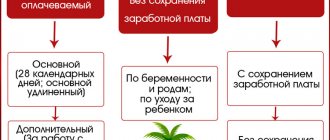What is an agreement
The agreement to the employment contract is a certain part of the employment contract, the conclusion of which is provided for by law. An employment agreement is a mandatory element of any employment contract and states the termination, extension or change of conditions.
An agreement between the parties - employer and employee - is drawn up at the moment when the employee is appointed to a new position or will receive a different salary. An additional agreement to the contract is drawn up at the time of termination of the contract and regulates the termination of its validity. The agreement of the parties indicates a change in the previously drawn up employment contract.
Labor and civil agreement
The employer has the right to conclude any work agreement with the employee, the type of which is determined by the mission being performed on the merits, and not by the headline on the first page. In practice, the parties - participants often confuse or identify these concepts. The main difference is the order of execution. Work under an employment agreement requires obedience to internal rules, adherence to discipline and a constant process of implementation, for which remuneration is intended under the employment agreement in the form of wages paid on a regular basis twice a month with an interval of 15 days between the payment of the advance and the main part of the wage.
A civil contract provides for a one-time performance of certain work, payment for a specific result obtained, the acceptance of which is made on the basis of a certificate of completion of work. The contractor is not obliged to obey internal regulations, but also to enjoy the rights provided for employees, including social guarantees. If the work does not require the involvement of third parties, then a simple agreement without notarization is drawn up. If it is necessary to involve third parties, a tripartite agreement is drawn up with the involvement of a third party. The contractor may turn to third-party assistance without the consent of the customer.
A standard sample employment agreement for a certain type of work cannot be classified as labor if it provides for one-time execution with specific deadlines.
The difference between an employment agreement and a civil law agreement is presented in detail in the table:
| Criteria for differences | Civil law | Labor |
| Parties - participants | Customer and performer | Employer and employee |
| Documents upon conclusion | An agreement indicating the terms of execution without entering information into the work book | Official registration according to the Labor Code of the Russian Federation, accompanied by the preparation of an order for admission and an entry in the work book |
| Subject of the agreement | Final result | Continuous process |
| Regulatory documents | Civil Code | Labor Code |
| Reward | In the agreed amount after the customer accepts the work by signing a certificate of completion, which means satisfaction with the result | Salary in accordance with the terms of internal local documents, paid 2 times monthly with an interval of no more than 15 days |
| Internal routine and discipline | Working hours are set by the contractor without agreement with the customer. | Mandatory adherence to the schedule established in internal documents |
| Skill level | Not an essential condition, the emphasis is on the quality of work | Determines wages and what level of skill is required |
| Social guarantees | Activities are carried out at your own peril and risk | In accordance with the Labor Code, all provided guarantees apply |
| Validity | From the start of work to the time of delivery | Indefinitely, unless a specific period is agreed upon in advance |
Inspecting structures try to equate the involvement of enterprise employees and third parties in civil legal relations with hidden labor relations beneficial for the employer in order to minimize payments to the budget and extra-budgetary funds. Registration under a civil law contract that regulates the work being performed is equated to a sham transaction and additional tax revenues, payment of penalties and interest for each day of delay.
Download a Sample Employment Agreement (20.9 KiB, 325 hits)
How to conclude an agreement
An employment agreement is concluded subject to mandatory compliance with a certain legal procedure and provides for a sample and a completed application. In this case, you need to follow the order, sample and deadlines. An agreement between the parties must be concluded in the following cases:
- the employee is transferred to a new workplace on his own initiative;
- a pregnant woman is appointed to a new position;
- transfer of an employee to another location;
- appointment to a new workplace at the initiative of the employer;
- when working conditions change;
- when the contract is extended or terminated.
Employment Agreement Possibilities
This document helps regulate the relationship between the parties and helps everyone understand the scope of their activities and the expected requirements. The agreement gives the right:
- accept an employee for an indefinite period of service, thereby the contract becomes indefinite, or immediately determine specific terms of service and then the employee will be hired for a position under the terms of a fixed-term contract;
- the contract helps to recruit exactly the employee whose qualifications and education will help him perform specific work activities;
- the contract contains information about the work schedule, weekends and working days;
- the contract reflects the amount of wages and the employer’s obligation to pay remuneration within a clearly defined time frame;
- the provisions of the contract contain information about the creation of suitable conditions for the performance of work, which the employer must fulfill on his part.
To register an employee for service, the HR department must take care of filling out an application for employment, as well as
the order by which the employee is hired for a particular position. Each employee receives a special accounting form and an entry in the work book. An employee is hired by a particular institution for a specific position or is engaged in some other part-time activity. There are times when an employee fulfills several responsibilities for different positions at once. His assigned scope of work cannot be transferred to any other person for execution and is of a purely personal nature.
An employment agreement may be of a fixed-term nature and based on the conclusion of an employment contract. By agreement of the parties, the volume of work to be performed, their responsibilities, deadlines for the end of work, remuneration and reasons for early termination of the contract between the parties are established.
In addition to his direct obligations, an employee may undertake other part-time work activities. This means that in addition to performing his main job, the employee agrees to perform auxiliary activities on the territory of the same enterprise or in another organization, in his free time.
Signing and renewal of the agreement
Signing an agreement is possible if the interests of all parties are taken into account after the negotiation stage. For this purpose, an application and a special sample are provided, the form of which is determined by law. The agreement must be signed by all parties to the case and participants in the relevant negotiations. To do this, it is necessary to negotiate the upcoming conclusion of an agreement, which must be carried out within three months.
The agreement between employer and employee can be renewed on time. To do this, you need to comply with the legal order. In this case, an additional agreement to the employment contract is concluded. This document also provides a sample, filling procedure, writing an application and is drawn up according to the same standards as the employment agreement:
- provided in writing within a certain period of time;
- undergoes state registration of agreements;
- the agreement between the parties is notarized.
Types of employment contracts
In most cases, a contract with employees is concluded for an indefinite period, that is, it does not stipulate the expiration of the document. It also happens that the contract specifies the period of its validity; this depends on the nature of the work or the conditions under which it is performed. Filling out such a document is discussed in detail in Part 1 of Art. 59 Labor Code of the Russian Federation.
According to the validity period, they are divided into those concluded for an indefinite period and those concluded for a definite period (no more than 5 years).
A fixed-term employment contract will become indefinite if, after the expiration of the period specified in it, the employee continues to work. In this case, the document will be considered issued for an indefinite period. Therefore, there is no need to conclude a new, open-ended agreement. However, an open-ended contract can become a fixed-term one; to do this, you need to terminate the previous contract and draw up a new one indicating its validity period. Such manipulations will need to be justified, Art. 59 Labor Code of the Russian Federation.
Based on the nature of working relationships, the following types can be distinguished:
- at the main place of work;
- for internal and external part-time work (part-time work is impossible without concluding an employment contract, this is the main condition for this type of employment);
- temporary work (work at a seasonal enterprise for less than 2 months, if it is necessary to replace an employee on sick leave);
- short-term contract;
- with employees performing work remotely;
- state (municipal) service.
Please take into account the fact that the Labor Code of the Russian Federation and regulatory legal acts related to labor relations do not apply to certain categories of citizens, provided that they are not employers or their representatives:
- military personnel on duty;
- persons working under civil contracts;
- other persons established by Federal Law (Article 11 of the Labor Code of the Russian Federation).
Depending on the legal status of the employee, the contract can be concluded:
- with minor citizens;
- with persons performing family responsibilities;
- with foreigners;
- with persons who do not have citizenship.
According to the nature of working conditions, they are divided as follows:
- normal working conditions;
- possibility of employment at night;
- work in the regions of the Far North and in territories equivalent to them;
- working under hazardous working conditions.
An employment contract can be drawn up at the main place of work, or maybe part-time. In the first case, the employee works full-time at a full-time rate. This is where he keeps his work book, unless the employee refuses to keep it on paper.
In the second case, the employee works part-time in his free time from his main job. This work cannot last more than four hours a day. The document signed with the employee indicates that the work being performed is part-time. It is not allowed to conclude such contracts with persons under 18 years of age, as well as with those whose main work is classified as difficult or is performed in hazardous working conditions, if the combination of jobs involves working in the same conditions. But we have already written about this.
The contracts concluded with managers and chief accountants deserve special attention. When compiling them, you need to take into account a number of nuances, in comparison with other categories of workers. We’ll talk about drawing up an employment contract with the chief accountant in my next article.
Types of agreements
There are certain types of agreements, the form of which is different: general, interregional, regional, sectoral, territorial, additional agreement.
Labor legislation also provides for the following types of agreements, depending on the number of participants:
- double sided;
- tripartite agreement.
The additional agreement and its type are determined during negotiations between the employee and the employee. In this case, an application is provided, a sample and deadlines are observed.
An additional agreement to the employment contract is concluded after negotiations between the parties, during which all interests are taken into account and the application is drawn up on time. Each employment agreement differs in purpose, which affects the procedure, sample, term and type to which the employment agreement and the corresponding application correspond.
A tripartite agreement is concluded with the obligatory participation of responsible state executive authorities, or a tripartite agreement is concluded in the presence of local government bodies of a municipal scale. In this case, a statement is provided and a specific one must be followed by a deadline and a sample
Question No. 20. Agreements. Their types and scope
Agreement is a legal act regulating social and labor relations and establishing general principles for regulating related economic relations, concluded between authorized representatives of workers and employers at the federal, interregional, regional, sectoral (intersectoral) and territorial levels of social partnership within their competence.
Types of agreements:
1) by agreement of the parties participating in collective bargaining, agreements can be bilateral or trilateral. Agreements providing for full or partial financing from the relevant budgets are concluded with the mandatory participation of the relevant executive authorities or local governments that are parties to the agreement.
2) Depending on the scope of regulated social and labor relations, agreements may be concluded:
è general - establishes general principles for regulating social and labor relations and related economic relations at the federal level.
è interregional - establishes general principles for regulating social and labor relations and related economic relations at the level of two or more constituent entities of the Russian Federation.
è regional - establishes general principles for regulating social and labor relations and related economic relations at the level of a constituent entity of the Russian Federation.
è sectoral (inter-industry) - establishes general conditions of remuneration, guarantees, compensation and benefits for employees of the industry (sectors). It can be concluded at the federal, interregional, regional, territorial levels of social partnership.
è territorial - establishes general working conditions, guarantees, compensation and benefits for employees in the territory of the relevant municipality.
è other agreements - agreements that can be concluded by the parties at any level of social partnership in certain areas of regulation of social and labor relations and other relations directly related to them.
The content and structure of the agreement are determined by agreement between representatives of the parties. The agreement may include mutual obligations of the parties on the following issues: wages; labor conditions and safety; work and rest schedules; development of social partnership; other issues determined by the parties.
Conclusion and modification of the agreement : the draft agreement is developed during collective bargaining. The procedure and timing for developing the project and concluding the agreement are determined by the commission for regulating social and labor relations. Comes into force on the day it is signed by the parties or on the date established by the agreement. Amendments and additions to the agreement are made in the manner established by the Labor Code.
The validity period is determined by the parties, but cannot exceed more than three years.
The agreement applies to all employers who are members of the association of employers that entered into the agreement. Termination of membership does not relieve the employer from fulfilling the agreement entered into during the period of his membership. In cases where several agreements apply to employees at the same time, the terms of the agreements that are most favorable to the employees are applied.
Question No. 21. Employment contract: concept and its meaning, content of the employment contract. Its types.
Labor contract (TL) is an agreement between an employer and an employee, according to which the employer undertakes to provide the employee with work for a specified labor function, to provide working conditions provided for by labor legislation and other regulations containing labor law norms, a collective agreement, agreements, local regulations and this agreement, pay the salary on time and in full, and the employee undertakes to personally perform the labor function defined by this agreement and comply with the internal labor regulations.
Parties to the employment contract: employee and employer.
!!! The age from which it is possible to conclude a TD is 16 years old, from 15 and 14 according to Art. 63 TK.
The TD is in writing and drawn up in 2 copies, each of which is signed by the parties. The employee’s receipt of a copy of the TD must be confirmed by the employee’s signature on the employer’s copy.
The TD indicates: full name of the employee and name of the employer; information about identification documents of the employee and the employer - physical. faces.; TIN (for employers, with the exception of individuals who are not individual entrepreneurs); information about the employer’s representative who signed the TD and the basis by which he is vested with such powers; place and date of conclusion of the contract.
Mandatory conditions included in the TD:
è place of work, if the employee is hired at a branch or other separate unit located in another area;
è labor function – a specific type of assigned work in accordance with the staffing table, indicating the position, profession and qualifications;
è start date of work, and in the case of a fixed-term contract – its validity period and grounds for conclusion;
è conditions of remuneration (including the size of the tariff rate, additional payments, allowances);
è working hours and rest schedule (if different from the general rules);
è compensation for hard work and work with harmful working conditions;
è condition on compulsory social insurance.
Additional conditions may also be provided that do not worsen the employee’s position: probation, non-disclosure of trade secrets, etc. By agreement of the parties, the employment contract may also include the rights and obligations of the employee and the employer. TD can be concluded for an indefinite period and for a certain period of not more than 5 years (fixed-term contract). The TD comes into force from the day it is signed by the employee and the employer, or from the day the employee is actually admitted to work.
Types of TD according to their validity periods:
1) for an indefinite period;
2) for a specified period of not more than five years (fixed-term employment contract).
Urgent TD can be concluded in two cases:
è when the employment relationship cannot be established for an indefinite period, taking into account the nature of the work to be done or the conditions for its implementation (established in Part 1 of Article 59);
è by agreement of the parties to the employment contract, without taking into account the nature of the work to be done and the conditions for its implementation (Part 2 of Article 59).
Termination of the agreement
The agreement between the employer and the employee is focused directly on the result of future work, which must be achieved after completing tasks and tasks on time. If an additional agreement to the employment contract is concluded, then it acts only as a certain means for the employee to fulfill his obligations.
An additional agreement to the contract, the form of which differs from the employment contract, does not regulate labor standards and conditions.
The agreement to terminate the contract is signed at the initiative of the employee and the employer and states the termination of the contract. In addition, an agreement to terminate the contract can be signed after the expiration of the document, after which the document may be terminated. The termination agreement provides for the cancellation of all conditions that govern the employment agreement. Termination of an employment contract by agreement of the parties can also occur in court.
Author of the article
An employment contract is a written agreement of the parties on the substance of the labor functions performed by the employee. Depending on the job duties performed and other features of work activity, the following types of employment contracts can be distinguished in Russian law.
By validity period:
1. An open-ended employment contract is a written agreement with the employer, concluded by the employee for an indefinite period. That is, a company employee can perform his or her job duties without time limits, until the occurrence of other circumstances affecting the execution of the contract.
2. Fixed-term employment contract - written consent of the parties, according to which the employee is hired for a certain period. The maximum possible term of such an employment agreement cannot exceed five years. Such an employment contract can be concluded by the parties only in cases provided for by labor legislation. The Labor Code of the Russian Federation (LC RF) contains an exhaustive list of circumstances that allow the conclusion of such an employment contract with an employee. In any other case, the employer is obliged to enter into an open-ended employment contract. The employment agreement, a sample of which is presented by clicking on the link, can also be found in the “Employment agreements” section of the main page of our website.
According to the presence of a probationary period, the following types are classified:
— An agreement concluded without assigning a probationary period to the accepted employee.
— Contract with a probationary period. Any new employee may be assigned a probationary period in order to verify that his professional skills meet the requirements. This period for ordinary employees cannot exceed more than three months. In exceptional cases, for employees of a special category (general directors, their deputies, chief accountants, heads of branches, etc.) a probationary period of up to six calendar months may be assigned.
By type of work performed we can distinguish:
— Employee agreement for the main place of work;
— Contract for part-time work.
In accordance with the characteristics of the job function performed, the following types can be distinguished:
— Temporary employment contract. An agreement under which the work performed does not exceed two calendar months.
— Seasonal employment agreement. The work performed is limited by the time of year (season).
— An employment contract concluded by an individual employer.
— Employment agreement for remote work from home.
Separately, it is necessary to highlight the employment contract concluded with civil servants (state labor contract) by type of service:
- state civil service,
- law enforcement service,
- military service.
Each type of employment contract has its own characteristics. Some of them are regulated by separate legislative acts and are not subject to the Labor Code of the Russian Federation. A separate category of contracts (employment contracts with directors of companies, their deputies, etc.) is regulated by the Labor Code of the Russian Federation, only to the extent that it does not contradict corporate law (the law on joint stock companies, etc.).
A separate category is occupied by civil contracts concluded with individuals to perform any specific work. Conventionally, it cannot be called a type of employment contract, since its action is not regulated by the labor law of the Russian Federation, however, in essence of the volume of work performed, labor functions may not differ in any way from the labor duties of an employee who has entered into an employment contract. It must be remembered that by concluding a civil contract, an individual is not accepted into the staff of the enterprise, and, therefore, he is not subject to social guarantees and compensation provided for by the Labor Code of the Russian Federation.
On our website you can find various types of employment contracts, as well as samples of employment agreements, which can be downloaded absolutely free of charge in the “Sample Documents” section.
Also, we are ready to develop any sample legal document for you personally. We wish you good luck!









